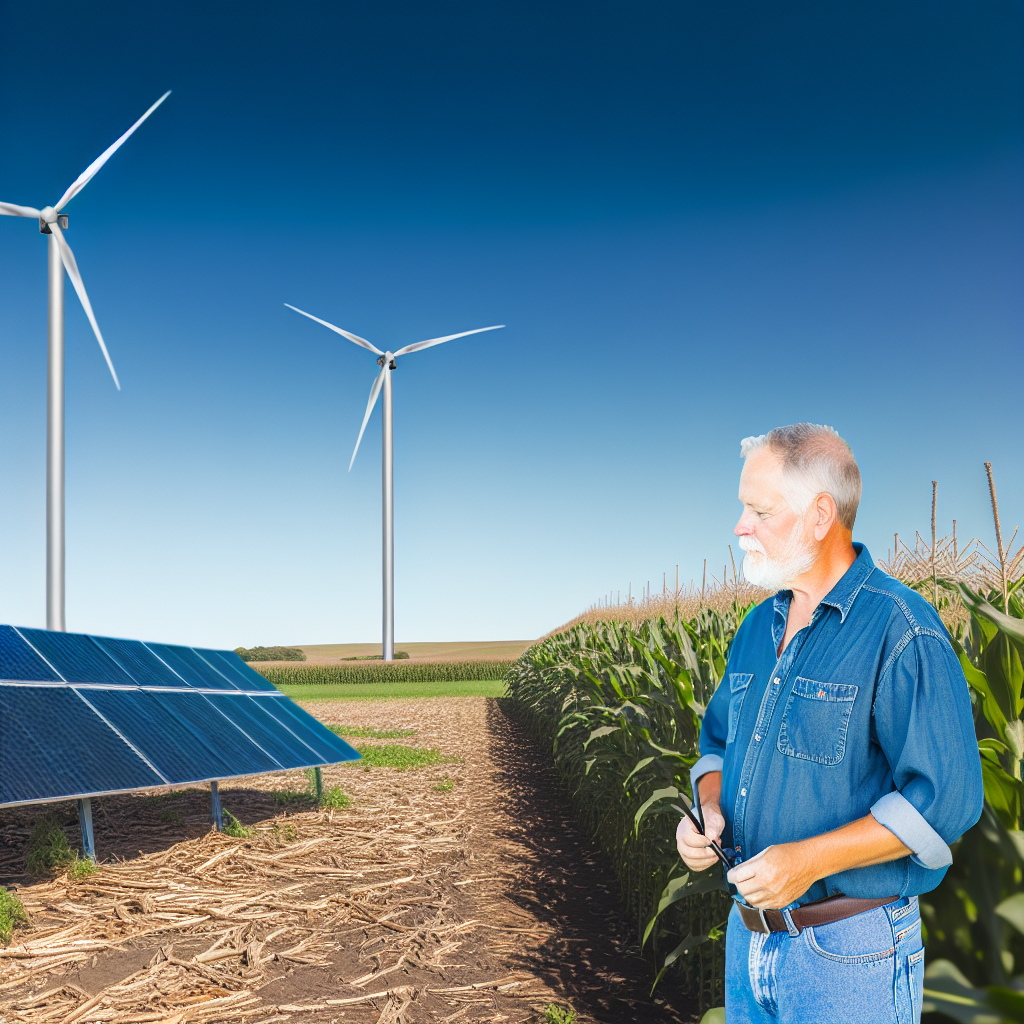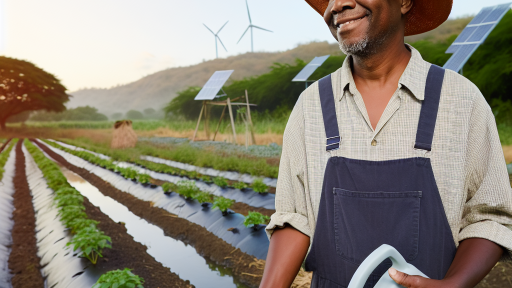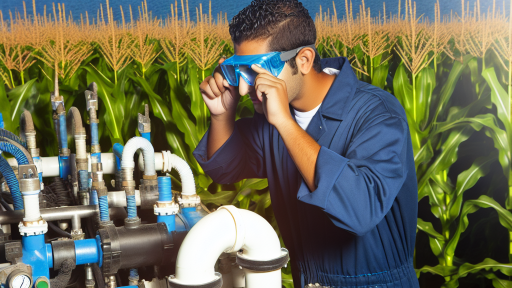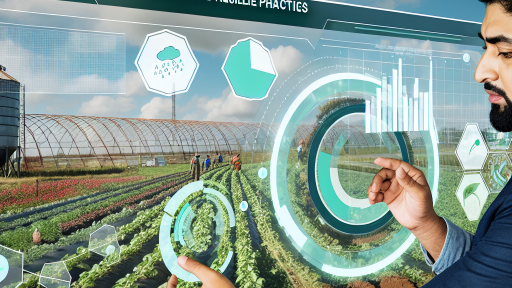Introduction to Renewable Energy in Sustainable Farming
Renewable energy plays a vital role in sustainable farming.
It reduces the reliance on fossil fuels significantly.
In addition, it helps in creating eco-friendly farming practices.
Farmers can harness solar, wind, and bioenergy sources.
These resources provide both power and operational efficiency.
As a result, sustainable farming enhances productivity.
The Importance of Renewable Energy
Renewable energy sources contribute to environmental preservation.
They reduce greenhouse gas emissions and air pollutants.
This shift promotes a healthier planet for future generations.
Moreover, renewable energy supports energy independence for farmers.
Farmers can access local energy resources, minimizing costs.
Types of Renewable Energy Utilized in Farming
Solar energy is one of the most common forms used.
Farmers install solar panels on rooftops and fields.
Wind energy is another effective choice in open areas.
Wind turbines generate power to operate various farm equipment.
Transform Your Agribusiness
Unlock your farm's potential with expert advice tailored to your needs. Get actionable steps that drive real results.
Get StartedBioenergy is produced from organic waste on farms.
This includes crop residues and animal manure.
Benefits of Adopting Renewable Energy
The use of renewable energy enhances farm productivity.
Additionally, it leads to significant cost savings over time.
Farmers also experience greater energy reliability.
With renewable energy, production can continue uninterrupted.
Furthermore, it improves public perception of farming practices.
Consuming renewable energy attracts eco-conscious consumers.
Benefits of Renewable Energy Adoption in Agriculture
Reduction of Energy Costs
Renewable energy significantly reduces operational costs for farms.
Solar panels often lead to lower electricity bills.
Wind energy can provide a consistent source of power.
Farmers can reinvest their savings into other areas of their operations.
Environmental Sustainability
Utilizing renewable energy helps reduce carbon emissions.
This transition contributes to cleaner air and a healthier environment.
Additionally, it minimizes dependence on fossil fuels.
Farmers can practice responsible stewardship of the land.
Improved Energy Independence
By adopting renewable sources, farmers gain more energy autonomy.
This independence protects them from fluctuating energy prices.
Moreover, it enhances resilience during energy shortages.
Farmers can ensure their operations continue uninterrupted.
Increased Crop Yields
Renewable energy can enhance irrigation efficiency.
Advanced technologies rely on renewable sources for operation.
This results in healthier crops and higher productivity.
Consistent energy supply supports precision farming techniques.
Showcase Your Farming Business
Publish your professional farming services profile on our blog for a one-time fee of $200 and reach a dedicated audience of farmers and agribusiness owners.
Publish Your ProfileEncouragement of Local Economies
Renewable energy projects often foster local job creation.
Installation and maintenance of renewable systems require skilled labor.
Local businesses benefit from increased economic activity.
Farmers also strengthen community ties by supporting local initiatives.
Innovation and Technological Advances
The shift to renewable energy sparks innovation in farming methods.
Farmers adopt cutting-edge technology to optimize energy use.
This innovation often leads to better resource management.
It also promotes sustainable practices across the agricultural sector.
Types of Renewable Energy Sources Used in Farming
Solar Energy
Solar energy powers various farming operations effectively.
Farmers install solar panels to harness sunlight for electricity.
This energy can run irrigation, heating, and cooling systems.
Additionally, solar energy reduces reliance on fossil fuels.
Wind Energy
Wind energy emerges as a popular choice for sustainable farming.
Wind turbines convert kinetic energy into usable power.
These turbines often serve remote farms with limited access to electricity.
Moreover, wind energy decreases operational costs significantly.
Biomass Energy
Biomass energy utilizes organic materials from farms.
Farmers convert waste products into energy through anaerobic digestion.
This process produces biogas, which can power engines or generators.
Biomass energy contributes to a circular economy in agriculture.
Hydropower
Hydropower harnesses the energy of flowing water.
Farmers near rivers or streams can implement small hydroelectric systems.
This renewable source provides a constant power supply.
Furthermore, hydropower systems help manage water resources effectively.
Geothermal Energy
Geothermal energy taps into the Earth’s internal heat.
Farmers use this energy for heating greenhouses or soil.
It promotes optimal growing conditions year-round.
Geothermal systems can significantly reduce heating costs.
Gain More Insights: Renewable Energy Options for Climate-Smart Farms
Case Studies of Successful Renewable Energy Implementation in Farms
Solar Power in Organic Farming
Sunny Acres Farm utilizes solar panels to power its operations.
This 50-acre organic farm in California significantly reduces electricity costs.
Consequently, they reinvest savings into sustainable practices.
As a result, they enhance their crop yields and soil health.
Furthermore, solar energy provides clean power for irrigation systems.
Other farmers have followed suit, adopting similar solar installations.
Wind Energy for Large-Scale Agriculture
Greenfield Farms is located in a windy region ideal for wind energy.
This farm installed several wind turbines that generate substantial energy.
These turbines now supply power for heavy machinery and facilities.
Thus, the farm lowers its carbon footprint significantly.
In addition, Greenfield sells excess energy back to the grid.
Showcase Your Farming Business
Publish your professional farming services profile on our blog for a one-time fee of $200 and reach a dedicated audience of farmers and agribusiness owners.
Publish Your ProfileConsequently, this generates additional income for the farm.
Biogas Systems in Livestock Farming
Mountain View Ranch implemented a biogas system to manage waste.
This system converts manure into renewable energy for heating.
As a result, the ranch reduces waste management costs dramatically.
Moreover, it produces a nutrient-rich fertilizer from the process.
This fertilizer enhances soil quality and supports sustainable crops.
Other livestock farms are exploring similar biogas options.
Hybrid Energy Solutions
Riverbend Farms combines solar and wind energy systems.
This hybrid system provides a consistent energy supply year-round.
Farm managers report increased energy resilience and efficiency.
Additionally, they have reduced their reliance on fossil fuels.
Local governments support these initiatives through grants and incentives.
Furthermore, other farms in the area are now considering hybrid setups.
Community Supported Agriculture and Renewable Energy
Community Supported Agriculture (CSA) initiatives embrace renewable energy sources.
For example, Harvest Community Garden uses solar power for operations.
This sustainable approach attracts more local customers and supports the environment.
Farmers share energy costs among members, maximizing benefits.
Consequently, neighbor farms are encouraged to adopt similar practices.
This collaboration fosters a community focused on sustainability.
Explore Further: Solar-Powered Irrigation Systems for Efficient Water Use
Challenges and Barriers to Renewable Energy Adoption in Agriculture
Financial Constraints
Many farmers face financial challenges when adopting renewable energy systems.
High upfront costs for installation deter potential adopters.
Additionally, access to financing options can be limited for small farms.
Many farmers have tight budgets, making investments difficult.
Moreover, the return on investment may not be immediately apparent.
Technological Limitations
The availability of technology can impede renewable energy adoption.
Farmers may lack access to innovative energy solutions.
Some regions have limited infrastructure for renewable energy support.
Additionally, farmers might face challenges integrating new technologies with existing systems.
This can lead to concerns about reliability and efficiency.
Regulatory and Policy Barriers
Regulatory hurdles can complicate the adoption of renewable energy.
Complex permitting processes may discourage farmers from pursuing projects.
Furthermore, inconsistent policies across regions induce uncertainty.
Many farmers remain unaware of available incentives and programs.
This lack of information reduces participation in renewable energy initiatives.
Knowledge and Awareness Gaps
Knowledge gaps persist regarding renewable energy options and benefits.
Many farmers may not fully understand the technologies available.
Educational resources on renewable energy for agriculture are often scarce.
Additionally, networking opportunities can be limited.
Without access to information, farmers struggle to make informed decisions.
Showcase Your Farming Business
Publish your professional farming services profile on our blog for a one-time fee of $200 and reach a dedicated audience of farmers and agribusiness owners.
Publish Your ProfileCultural Resistance
Cultural norms and practices impact renewable energy adoption in farming.
Traditional farming methods may discourage experimentation with new systems.
Some farmers may prioritize short-term gains over long-term sustainability.
This resistance to change can hinder progress toward renewable energy integration.
Ultimately, successful adoption requires a shift in mindset and practices.
See Related Content: Transitioning to Renewable Energy in Agriculture

Technological Innovations Enhancing Renewable Energy Use in Farming
Solar Energy Solutions
Solar panels provide a reliable energy source for farms.
These panels convert sunlight into electricity efficiently.
Farmers can power irrigation systems using solar energy.
Moreover, solar power reduces reliance on fossil fuels.
Additionally, some farms create excess energy for sale.
Wind Energy Applications
Wind turbines harness wind energy to generate power.
Farmers in windy regions benefit significantly from this tech.
By installing turbines, they cut energy costs effectively.
Moreover, wind energy promotes sustainability in agriculture.
It helps mitigate the effects of climate change in farming.
Biogas Production
Biogas systems convert organic waste into renewable energy.
Farmers utilize animal waste to generate electricity.
This process reduces waste while producing energy efficiently.
Moreover, biogas plants help enhance soil fertility.
They also contribute to reducing greenhouse gas emissions.
Smart Agriculture Technologies
Smart sensors optimize energy use in farming operations.
These technologies monitor soil and crop conditions continuously.
This data helps farmers make informed energy decisions.
Furthermore, automation technologies improve resource efficiency.
Eventually, this leads to reduced energy consumption across the board.
Geothermal Energy Systems
Geothermal energy provides heating solutions for farms.
This energy source is sustainable and reliable year-round.
Farmers can use it for greenhouse heating efficiently.
Additionally, it supports livestock comfort during colder months.
Overall, geothermal energy contributes to a balanced ecosystem.
See Related Content: Wind Energy Solutions for Modern Farming Practices
Policy Recommendations to Promote Renewable Energy in Agriculture
Introduction to Policy Needs
Renewable energy adoption is crucial for sustainable farming.
Government policies can accelerate this transition.
Therefore, it is essential to create supportive frameworks.
Incentives for Farmers
Financial incentives encourage farmers to adopt renewable energy solutions.
Subsidies for solar panels and wind turbines are vital.
Tax credits can significantly reduce initial investment costs.
Additionally, grants can support research and development in this sector.
Education and Awareness Programs
Raising awareness about renewable energy benefits is necessary.
Showcase Your Farming Business
Publish your professional farming services profile on our blog for a one-time fee of $200 and reach a dedicated audience of farmers and agribusiness owners.
Publish Your ProfileWorkshops and training can equip farmers with essential knowledge.
Moreover, success stories from early adopters can inspire others.
Community engagement will foster a culture of sustainability.
Regulatory Framework Enhancements
Streamlining regulations will facilitate easier adoption of renewable technologies.
Clear guidelines should exist for installation and operation.
Furthermore, simplifying the permitting process can encourage more farmers to participate.
Regular assessments of policies will ensure they meet farmers’ needs.
Partnerships with Private Sector
Collaboration with private companies can drive innovation.
These partnerships can develop tailored renewable energy solutions.
Additionally, they can provide essential financing options for farmers.
Successful collaborations can pave the way for scalable projects.
Long-term Sustainability Goals
Establishing clear sustainability goals is fundamental.
These goals should align with national and global sustainability efforts.
Monitoring progress will help evaluate the effectiveness of policies.
Ultimately, aligning economic viability with environmental sustainability will benefit all.
Future Trends and Predictions for Renewable Energy in Sustainable Farming
Integration of Advanced Technologies
Farmers increasingly adopt advanced technologies in renewable energy.
For instance, solar panels are becoming commonplace on farms.
They harness sunlight to supplement energy needs effectively.
Additionally, wind turbines are gaining traction in rural areas.
Such integration contributes to energy independence for farmers.
Moreover, smart technologies enhance energy efficiency further.
Expansion of Bioenergy Sources
Bioenergy plays a significant role in the sustainable farming landscape.
Farm waste can be converted into biofuels, reducing waste disposal issues.
Farmers are increasingly investing in anaerobic digesters.
These systems generate renewable energy while improving soil health.
Furthermore, advanced biofuels can reduce reliance on fossil fuels.
Government Incentives and Policy Support
Government policies are crucial in promoting renewable energy adoption.
Many countries offer tax credits and subsidies for renewable projects.
These incentives encourage farmers to invest in sustainable technologies.
Policy frameworks are evolving to support green energy initiatives.
Consequently, farmers are more likely to transition to renewable options.
Increased Consumer Demand for Sustainability
Consumer preferences are shifting towards sustainably produced food.
This trend pressures farms to adopt renewable energy solutions.
Many consumers are willing to pay a premium for eco-friendly products.
As a result, sustainable farming becomes a competitive advantage.
Farmers recognize that adopting renewable practices can meet this demand.
Community Engagement and Collaboration
Collaboration among farmers is becoming crucial for success.
Farmers are pooling resources to invest in renewable energy projects.
For example, community solar programs are emerging across regions.
Such initiatives allow multiple farmers to benefit from shared installations.
Showcase Your Farming Business
Publish your professional farming services profile on our blog for a one-time fee of $200 and reach a dedicated audience of farmers and agribusiness owners.
Publish Your ProfileMoreover, partnerships with energy providers enhance project viability.
Collaboration ultimately leads to a more significant impact on sustainability.
Additional Resources
USDA Science and Research Strategy, 2023-2026: Cultivating …




